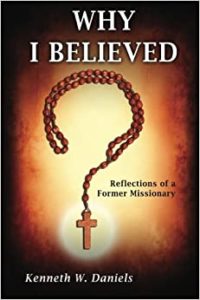Why I Believed 02 – Why did you leave God?
This post is part of a series.
 Continuing my series blogging my way through Why I Believed: Reflections of a Former Missionary, I highlighted the following passages in the first chapter.
Continuing my series blogging my way through Why I Believed: Reflections of a Former Missionary, I highlighted the following passages in the first chapter.
I have been told that if I had embraced a slightly different brand of Christianity, I could have avoided coming down this path. It was because I believed incorrectly, or because I wasn’t truly a believer in the first place, or because I did not seek God earnestly enough, or because I did not submit to his sovereignty, that I ended up abandoning the faith. At times I have explained to others my reasons for doubting, only to have these reasons dismissed with the question, “So what’s the real reason you left God?” I often sense a conviction on their part that my disbelief must stem from an inward moral flaw. (p. 3)
Don’t you hate it when, as a Christian, if you start to seriously ask questions, or decide to leave (permanently, or as in my case, for a period of years), that people accuse you of the faults outlined above? Let me put them into a nice list:
- You had to reject your first Christianity which was false or not the true thing (you’re throwing out the baby w/ the bathwater, rejecting a false Christianity not the real one)
- You weren’t a believer in the first place
- You didn’t seek God earnestly enough
- You didn’t want to submit to God’s ways
- You had some other deep moral flaw which causes you go to astray
In my case, my Christianity was poisoned by spiritual abuse and manipulation, and I *had* to let go of it all to redetermine what I thought was true. Surprisingly (or not), I did not remain an agnostic, but returned to a Christian faith. But to some extent, the first bullet above was true of me, and probably the last as well!
I often ask myself these questions about returning:
- Was I skeptical enough, or did I just return to what I knew? I don’t think so, since I grew up agnostic scientist, and could have easily stayed there.
- Did I just return because I had children? That was one of the mitigating factors, but at least from an intellectual point of view, that had little to do with it. But it did nudge me. Why is that?
Reasons to Doubt
Most of us, whether or not we remain in the fold, have wondered about God’s commands to the Israelite soldiers to kill men, women, boys and infants (keeping the virgins for themselves); his endorsement of slavery; the harshness of eternal hell; the apparent discrepancies between parallel passages in the Bible; the hit-and-miss nature of prayer; the mystery of so much human and animal suffering; the silence and hiddenness of God; the kindness and moral uprightness of so many nonbelievers; and the apparent conflict between science and the Bible. (p. 3)
Some of these reasons drove me away, others did not. Here’s my feel for the level of difficulty these give me (1-5, 5 = high):
- Killing of men, women, children (3) – I have to admit, this only bothered me a little, partly because I thought the typical defense of it was logically consistent – that is, that(a) God Himself wiped out all humanity in the flood
(b) Such commands were infrequent one-off events, not prescribed principles
(c) God used other nations to judge Israel similarly
(d) Sometimes children, like it or not, do suffer from their parents’ poor decisions, which includes dying in warfare – think of it as ‘sins visited upon the children of sinful parents’ – while we don’t *like* that idea, it certainly does happen in the real world, like when a baby gets its mother’s crack addiction.Look, I’m not saying it’s an airtight argument, only that I found it somewhat convincing, and at least internally consistent. - Keeping Virgins (2) – well, until I read this book, I had not noticed that passage. A bit troubling. Again, however, there is an out – the Bible records that Moses did this, but not that God condoned or commanded it – so we could be reading a historical narrative that has little to do with God condoning such behaviors. But hey, I’m not defending it, just talking out loud here.
- Eternal Hell (4) – this is one of the reasons that I left Christianity – how could eternal punishment be a fair punishment for temporal sins done over a short lifetime? While I’ve heard the following explanations since then, this is one unanswered question that I keep on the back burner. Answers include:(a) Our sense of what is ‘just’ is certainly skewed with self interest and an inferior appreciation for holiness
(b) While we should use our intuition and reason help us figure out what is just or fair, we should also ask “is the truth otherwise, and counter-intuitive?” Wouldn’t be the first time!
(c) Perhaps the punishment is not just meted out by what we’ve done, but by what we ARE – that is, not fit for holiness due to our inherited state of guilt. I know many blanch at the idea of original sin, but something the Apostle Paul wrote in one place stayed with me:For just as because of their union of nature in Adam all people die, so also by virtue of their union of nature shall all in Christ be made alive. (1 Corinthians 15:22, Amplified Bible) - Inconsistencies in parallel passages (4) – In looking into these, of course, there are always ‘harmonies,’ or possible explanations. Some of them handle apparent contradictions very well, but there are a few that seem pretty egregious. We’ll have to look into this later – the reliability of scripture certainly is one of the most potent objections to Christianity.
- Inconsistent answers to prayer (4) – having prayed for many sick and seen none recover, I wonder – am I praying poorly, does God not answer this kind of prayer, or is there no God after all? I must admit, I have little or no prayer for healing, and am tempted to not pray at all when thinking of what seems like the relative ineffectuality of prayers. I read somewhere recently about a true blind study that showed no affect on healing by intercessors, which lends credence to the ‘prayer does nothing’ contention. More on that in later posts.
- Animal suffering (2) – since all creation supposedly fell with Adam, I am not troubled by this, esp. if you believe that animals do not have eternal souls. But still, a sensitive person will be horrified by animal suffering. What concerns me more is, if animals were all vegetarian before the fall, did God somehow do a huge genetic and morphological overhaul to design these amazing carnivores? The Bible does say that, in returning us to a ‘garden-like’ state, the ‘lion will once again lie down with the lamb,’ so maybe that was the prior state of things.
- Hiddeness of God (2) – God has never seemed that hidden to me, but all of the great saints, as well as atheists, have endured a dark night of the soul (see No One Sees God: The Dark Night of Atheists and Believers by Michael Novak). But perhaps this silence of God is only really experienced during great suffering. I’m not sure.
- Goodness and character in non-believers (1) – this used to trouble me until I came to a few realizations:(a) Common truth, or ‘wisdom’ is common to all enduring faith systems, as well as the understanding of virtues. This does not invalidate any one faith.
(b) Character and virtues like industry, honesty, and thrift, do not require faith, though perhaps those who have faith may practice some of these more easily or better if they are mature.
(c) The real question is not regarding common truth, but revealed truth, which is where faith systems differ. What happens after we die? What is God like? What is wrong with humanity? How do you fix it? How do we deal with suffering? These require evaluation and discrimination between claims. - Faith and science (1) – perhaps it’s my degree in Biochemistry, or my own willingness to doubt scientific orthodoxy, but having been inside science, and having thought through issues on my own, I have no trouble doubting common descent as an explanation of origins (you should see the mess of phylogenetic ‘trees’ now that we have so much more DNA mapped). I mean, ever since cosmologists have fairly definitively determined that the universe had a discrete beginning, thereby confirming the Biblical cosmology, I’ve not worried much if there are apparent disagreements between the two. Archaeologically speaking the scriptures are so well attested it’s just idiotic to doubt them – or so I think!
Anyway, I didn’t want this to be a defense of Christianity, and perhaps I should be more forthcoming about my doubts, but I’ve also resolved some along the way, at least tentatively. I’d love to enter into discussion. so please comment! Thanks.



